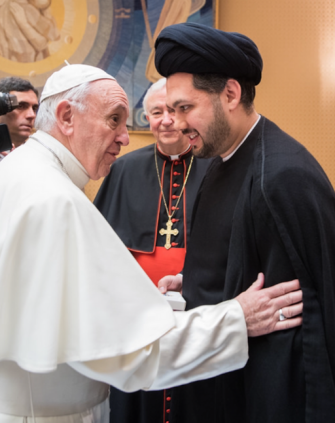Dicastery for Interreligious Dialogue
Christians and Muslims:
Promoters of Love and Friendship
Dear Muslim brothers and sisters,
The month of Ramadan is important for you, but also for your friends, neighbours and fellow believers of other religions, in particular Christians. Existing friendships are reinforced and others are built, paving the way for more peaceful, harmonious and joyful coexistence. This corresponds to the divine will for our communities, and indeed for all the members and communities of the one human family.
We are aware, dear friends, that peaceful and friendly coexistence faces many challenges and threats: extremism, radicalism, polemics, disputes, and religiously motivated violence. The threats are fueled by a culture of hate. We need, then, to find the most appropriate ways of countering and overcoming such a culture, enhancing instead, enhancing love and friendship, in particular between Muslims and Christians, due to the bonds that unite us. This is why we deemed it opportune to share some thoughts with you in this regard, hoping to receive yours as well.
All begins with our attitude towards each other, in particular when there are differences between us in religion, ethnicity, culture, language, or politics.
Differences can be perceived as a threat, but everyone has the right to his or her specific identity with its diverse components, yet without ignoring or forgetting what we have in common: “One is the community of all peoples, one their origin, for God made the whole human race to live over the face of the earth. One also is their final goal, God. His providence, His manifestations of goodness, His saving design extend to all men, until that time when the elect will be united in the Holy City, the city ablaze with the glory of God, where the nations will walk in His light” (Declaration on the Relation of the Church to Non-Christian Religions, Nostra Aetate, 28 October 1965, n. 1).
Negative attitudes and behaviours towards those who are different from us are unfortunately numerous: suspicion, fear, rivalry, discrimination, exclusion, persecution, polemics, insults, and backbiting, to name a few.
Social media platforms are common spaces for such harmful behaviours, perverting their role from being means for communication and friendship to being instruments for enmity and fighting. In this regard, Pope Francis has said: “Even as individuals maintain their comfortable consumerist isolation, they can choose a form of constant and febrile bonding that encourages remarkable hostility, insults, abuse, defamation and verbal violence destructive of others, and this with a lack of restraint that could not exist in physical contact without tearing us all apart. Social aggression has found unparalleled room for expansion through computers and mobile devices” (Fratelli Tutti, 3 October 2020, n. 44).
The opposites of the above-mentioned negative behaviours, are respect, goodness, charity, friendship, mutual care for all, forgiveness, cooperation for the common good, help to all those who are in any kind of need and care for the environment, in order to keep our “common home” a safe and pleasant place where we can live together in peace and joy.
We cannot prevent and counter the culture of hatred and, instead promote a culture of love and friendship, without a sound education for future generations in all the spaces where they are formed: in the family, at school, in places of worship, and on social media.
A world where justice, peace, fraternity and prosperity reign please the Almighty and brings joy, calling, therefore, our sincere and shared engagement.
Dear Muslim brothers and sisters, may you enjoy the Almighty’s abundant blessings during Ramadan and celebrate ‘Id al-Fitr in the joy resulting from fidelity and love for the Almighty and all persons you live with or meet.
From the Vatican, 3 March 2023
Miguel Ángel Cardinal Ayuso Guixot, MCCJ
Prefect
Msgr. Indunil Kodithuwakku Janakaratne Kankanamalage
Secretary









